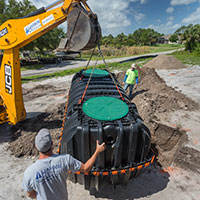 Many barrier island septic systems found to be leaking waste into the groundwater
Many barrier island septic systems found to be leaking waste into the groundwater
STORY BY LISA ZAHNER (Week of November 12, 2020)
As 500 barrier island homeowners rush to comply with a City of Vero Beach code requirement to have their septic systems inspected and pumped out by Dec. 31, many systems tested in October and November failed inspection – including half of those tested in the Bethel Creek neighborhood.
The high percentage of failures – more than one-third of the systems tested – validates the concerns of area scientists and environmentalists who have long said that worn-out septic systems are leaking waste into groundwater and contributing to ecological problems in the Indian River Lagoon, where seagrass die-off and fish kills have occurred.
Out of 115 systems recently inspected, 42 failed, according to city records. The greatest number of failures occurred in the South Beach neighborhood, within the city limits, where 20 of 38 systems were found to be faulty. Bethel Creek saw the greatest percentage of failures but a smaller raw number of worn-out septic systems, with six of 12 failing inspection.
In old Riomar, seven systems failed out of 21 inspected. The Live Oak neighborhood in Central Beach fared best, with nine failures noted among 44 inspection reports submitted for a 20-percent failure rate.
As of Friday, Vero Water and Sewer Director Rob Bolton said, “361 properties still have not supplied paperwork, while 15 properties supplied incomplete paperwork.”
Bolton said some homeowners are simply mailing in a receipt from a septic tank pump out they had within the last five years and this does not comply with city code. “A pump out is not the same thing as an inspection,” Bolton said. “We will contact these individuals as time allows and give them time to have an inspection done and file the proper inspection report.”
Homeowners with failing septic tanks must hook up to the city’s Septic Tank Effluent Pump or STEP system, which drains off the liquid waste from the septic tank and pumps it to the nearest sewer line. The cost for the conversion ranges from about $6,000 to $9,000 and can be financed through the City of Vero Beach. STEP system installation allows the septic tank to remain in place, so the homeowner avoids the cost and disruption of having the tank unearthed.
Under pressure from the city, homeowners are now clamoring to be converted to the STEP system to comply with code requirements.
“We had the number of STEP system applications increase from a running daily average of three or four, to 22 as of yesterday,” Bolton said on Nov. 5.
In October, Councilman Rey Neville – an early adopter of the STEP system – proposed to the council that the city should bring back the financial incentives it offered during the first year of the STEP system installations on the barrier island to encourage more people to comply with the code and get on city sewer service. City Manager Monte Falls strongly opposed this, saying it would not be fair to all the people who hooked up to the STEP system at full cost over the past three years.
The city does not do pump outs, inspections or STEP system installations. Homeowners must hire licensed private septic contractors for these services. For STEP installation, the contractor must have completed the city training on how to properly install the STEP system so it operates effectively and can be hooked up to the city sewer lines. It’s easier to install the STEP system during Vero’s normally “dry” winter season, and the hope is crews can make some headway on the pending work before the spring arrives.
To better get a handle on where septic tanks still exist in the city and which ones have not been inspected, Bolton said his department planned to release a data dashboard on the City of Vero Beach website (www.covb.org) this past Monday showing each septic system and its status.
“The dashboard will be an overlay of the STEP basin so you will be able to see the properties connected to STEP, the properties with passing systems, the properties with failing systems, the properties that have not had inspections done and the properties that have not filed proper reports.
Homeowners with septic systems on the mainland have until the end of 2022 to get their inspections and pump outs. Starting in January, city staff will begin making presentations to neighborhood groups on the mainland to educate homeowners about the STEP system and about how failing septic systems hurt the health of the Indian River Lagoon by leaching nutrients into the water. Nitrogen, which is found in human waste, is one of the main chemicals regulated by environmental agencies because they can cause algae blooms, kill sea grass and make the lagoon less habitable for fish and other wildlife.
The STEP system not only benefits the lagoon but also boosts the city’s sewer service customer base to spread the fixed costs of operating the sewer system and the wastewater treatment plant among more customers.




